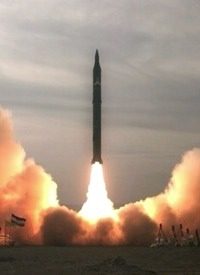
Iran test fired an improved version of its Sejil 2 medium-range missile on December 16, increasing tensions between Iran and Western powers. The Sejil 2 has a range of about 1,200 miles.
Britain’s Prime Minister Gordon Brown, speaking in Copenhagen after talks with UN Secretary General Ban Ki-moon, said the missile launch demonstrated the need for tougher UN sanctions against Tehran.
"This is a matter of serious concern to the international community and it does make the case for us moving further on sanctions," said Brown. "We will treat this with the seriousness it deserves."
However, VOA news quoted Meir Javedanfar of the MEEPAS center in Tel Aviv, Israel, who stated that the Sejil 2 missile is should not be cause for serious concern, noting:
There’s nothing new about this rocket that should worry the West. Iran has already tested solid fuel missiles before and Israel is already within the range of Iran’s missiles. I think it’s the political implications of this missile test that are noteworthy-and that is that Iran views the [nuclear] talks as dead-it doesn’t view the talks positively, and now it’s bracing for sanctions and quite possibly for war, and this missile test is a sign that Iran takes the military option very seriously and is ready to reciprocate if it’s attacked.
VOA news also cited Iran’s Defense Minister Ahmed Vahidi, who said that the Sejil 2 is part of Iran’s defensive forces, and that the test is intended to increase the deterrent capabilities of his nation’s military. Vahidi explained that the newer version of the missile has a shorter launch time, better deterrent capability, and that its two-stage, solid-fuel rocket makes it highly maneuverable.
Iran’s state-controlled Press TV had it’s eye on the West’s reaction as it quoted U.S. National Security Council spokesman Mike Hammer, who tied the firing to Iran’s nuclear fuel enrichment program: "Such actions will increase the seriousness and resolve of the international community to hold Iran accountable for its continued defiance of its international obligations on its nuclear program.”
The Iranian news bureau also observed that Iran faces pressure to halt its nuclear enrichment as world powers claim the program is aimed at building a nuclear bomb, but reiterated the official government position that “nuclear weapons have no place in its defensive doctrine and [Iran has] called for the removal of all weapons of mass destruction from across the globe.”
One of the most vocal reactions to the test came from Republican House Whip Eric Cantor, who said in a statement:
This missile test raises the specter of danger to U.S. national security interests. The world’s largest state-sponsor of terrorism now is closer to having a deliverable nuclear weapon. Should that day come, global stability and efforts to combat nuclear proliferation will be permanently compromised.
Cantor did not explain how a missile with a maximum range of 1,200 miles could endanger U.S. security interests, since the air distance from Tehran to the East Coast of the United States is approximately 6,000 miles.
Unless, of course, the congressman considers U.S. military forces within a 1,200-mile range of Iran to be vulnerable to attack by this new Iranian weapon, a highly unlikely scenario, since Iran’s leaders know that such a move would be tantamount to national suicide.
Whatever his reasoning, Rep. Cantor would do well to read the speech delivered by his House colleague, Texas Republican Ron Paul, on December 15, entitled: “Statement Opposing the Iran Refined Petroleum Sanctions Act.”
Though the speech is not about the missile launch, per se (it addresses legislation that would bar foreign entities from selling certain refined petroleum products to Iran), the language found within it also points out the folly of our saber-rattling style of diplomacy in dealing with what is admittedly an unfriendly nation. Rep. Paul warned:
As would be the case were we in the U.S. targeted for regime change by a foreign government, people in Iran will tend to put aside political and other differences to oppose that threatening external force. Thus this legislation will likely serve to strengthen the popularity of the current Iranian government. Any opposition continuing to function in Iran would be seen as operating in concert with the foreign entity seeking to overthrow the regime.”
Paul also warned that “sanctions and the blockades that are required to enforce them are themselves acts of war according to international law. I urge my colleagues to reject this saber-rattling but ultimately counterproductive legislation.”
It was similar U.S. sanctions imposed against Japan in the 1940s that backed that Asian nation into a corner from which it felt the only escape was to strike back, which it did at Pearl Harbor — an inviting and tempting target. As Bruce Walker noted in “Pearl Harbor: A True Day of Infamy”: “American sanctions were obviously intended to force Japan’s hand, and FDR had said that he wanted Japan or Germany to fire the first shot against us, as the means of thrusting the United States into World War II.”
If we have learned one lesson from history, it should be that the foreign policy advocated by Washington in his Farewell Address (“Observe good faith and justice toward all nations. Cultivate peace and harmony with all.”) is the best way to remain at peace.
Photo: AP Images



